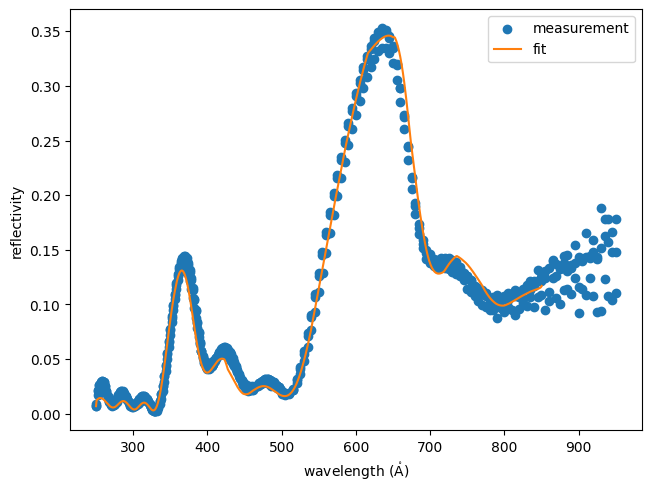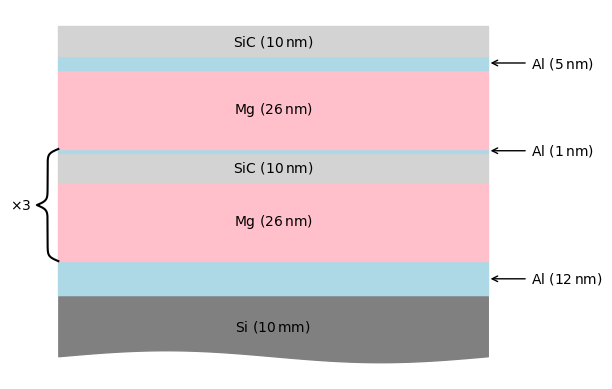multilayer_witness_fit#
- esis.flights.f1.optics.gratings.materials.multilayer_witness_fit()#
A multilayer stack fitted to the witness sample measurements given by
multilayer_witness_measured().This fit has five free parameters: the ratio of the thicknesses of \(\text{Mg}\), \(\text{Al}\), and the \(\text{SiC}\) to their as-designed thickness, the roughness of the substrate, and a single roughness parameter for all the layers in the multilayer stack.
Examples
Plot the fitted vs. measured reflectivity of the grating witness samples.
import numpy as np import matplotlib.pyplot as plt import astropy.units as u import astropy.visualization import named_arrays as na import optika from esis.flights.f1.optics import gratings # Load the measured reflectivity of the witness samples multilayer_measured = gratings.materials.multilayer_witness_measured() measurement = multilayer_measured.efficiency_measured # Isolate the angle of incidence of the measurement angle_incidence = measurement.inputs.direction # Fit a multilayer stack to the measured reflectivity multilayer = gratings.materials.multilayer_witness_fit() # Define the rays incident on the multilayer stack that will be used to # compute the reflectivity rays = optika.rays.RayVectorArray( wavelength=na.geomspace(250, 950, axis="wavelength", num=1001) * u.AA, direction=na.Cartesian3dVectorArray( x=np.sin(angle_incidence), y=0, z=np.cos(angle_incidence), ), ) # Compute the reflectivity of the fitted multilayer stack reflectivity_fit = multilayer.efficiency( rays=rays, normal=na.Cartesian3dVectorArray(0, 0, -1), ) # Plot the fitted vs. measured reflectivity fig, ax = plt.subplots(constrained_layout=True) na.plt.scatter( measurement.inputs.wavelength, measurement.outputs, ax=ax, label="measurement" ); na.plt.plot( rays.wavelength, reflectivity_fit, ax=ax, axis="wavelength", label="fit", color="tab:orange", ); ax.set_xlabel(f"wavelength ({rays.wavelength.unit:latex_inline})") ax.set_ylabel("reflectivity") ax.legend(); # Print the fitted multilayer stack multilayer
MultilayerMirror( layers=[ Layer( chemical=Chemical( formula='SiC', is_amorphous=True, table='kortright', ), thickness=9.60594508 nm, interface=ErfInterfaceProfile( width=1.90483881 nm, ), kwargs_plot={'color': 'lightgray'}, x_label=None, ), Layer( chemical='Al', thickness=4.80725357 nm, interface=ErfInterfaceProfile( width=1.90483881 nm, ), kwargs_plot={'color': 'lightblue'}, x_label=1.1, ), Layer( chemical=Chemical( formula='Mg', is_amorphous=False, table='fernandez_perea', ), thickness=26.62708342 nm, interface=ErfInterfaceProfile( width=1.90483881 nm, ), kwargs_plot={'color': 'pink'}, x_label=None, ), PeriodicLayerSequence( layers=[ Layer( chemical='Al', thickness=1.20181339 nm, interface=ErfInterfaceProfile( width=1.90483881 nm, ), kwargs_plot={'color': 'lightblue'}, x_label=1.1, ), Layer( chemical=Chemical( formula='SiC', is_amorphous=True, table='kortright', ), thickness=9.60594508 nm, interface=ErfInterfaceProfile( width=1.90483881 nm, ), kwargs_plot={'color': 'lightgray'}, x_label=None, ), Layer( chemical=Chemical( formula='Mg', is_amorphous=False, table='fernandez_perea', ), thickness=26.62708342 nm, interface=ErfInterfaceProfile( width=1.90483881 nm, ), kwargs_plot={'color': 'pink'}, x_label=None, ), ], num_periods=3, ), Layer( chemical='Al', thickness=12.01813392 nm, interface=ErfInterfaceProfile( width=1.90483881 nm, ), kwargs_plot={'color': 'lightblue'}, x_label=1.1, ), ], substrate=Layer( chemical='Si', thickness=10. mm, interface=ErfInterfaceProfile( width=1.00211621 nm, ), kwargs_plot={'color': 'gray'}, x_label=None, ), )
Plot a diagram of the fitted multilayer stack
with astropy.visualization.quantity_support(): fig, ax = plt.subplots() multilayer.plot_layers( ax=ax, thickness_substrate=20 * u.nm, ) ax.set_axis_off()

- Return type:

